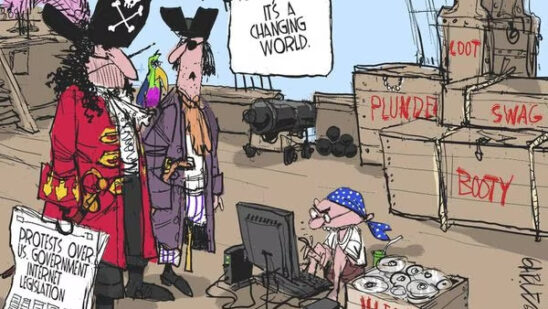
Back when the internet was a virtual ‘wild west’ of music, movies, and programs, millions of people would use programs like Napster and Bearshare to download just about everything they could get their hands on at no cost. But as we all know, things have changed drastically. Lawsuits and the threat of hefty fines have caused many file-sharing sites to close their virtual doors for good. And new copyright laws aimed at stopping illegal downloads, along with the arrests of downloaders have put fear into the hearts of many who want their music and other files for free. So, are copyright laws enough to stop illegal downloads completely?
Illegal Downloading Stoppage Efforts in Australia
The National Broadband Network (NBN), the nation’s wholesale-only, open-access data network, is currently in development in Australia, promising connections of up to one gigabit per second. Some experts believe that these incredibly high speeds, once all in Australia have access to them, will quadruple all internet traffic in the next four years.
And that spells trouble, according to those who see a real and present threat to copyright due to those that some are calling ‘digital kleptomaniacs’. They say that once the gigabit speeds are available, the floodgates will open, and instances of copyright theft will grow exponentially, perhaps uncontrollably. Therefore, those who are worried say that the NBN should be used as a platform for policing copyright violators and be obligated to take steps to stop online piracy.
But those on the other side of the fence say that new copyright laws won’t be effective simply because of the complexity of the situation. Australia hasn’t yet determined the role of ISPs in the illegal downloading conundrum, although they have identified that an ISP will have either a contributory or vicarious liability when it comes to copyright infringement.
After the ISP has been considered, it’s the search engine’s turn. Do the audio, text, and images they crawl the web for and reproduce in search results translate into copyright infringement on the part of the search engine? And what about the caching of copyrighted material? These are just some of the difficult questions that have yet to be answered.
Interesting Happenings in New Zealand
Last year, a survey of over one thousand Kiwis between the ages of 15 and fifty was conducted regarding internet activity. And the results were enlightening. One-third of those surveyed admitted to using P2P software to download music. When asked whether they would stop if they received a warning about their illegal downloading, 70% said they would. The country’s new “Skynet” law targets internet account holders whose accounts have been used to download copyrighted material using P2P software.
If confirmed, the account holder faces a fine of $15,000. However, this is not foolproof either, as those account holders who don’t engage in illegal downloading can be fined if someone else should use their connection for this purpose. The ‘three-warning’ system, whereby a user’s connection is disabled on the third warning, has yet to be in place. But here too, the outcry has been loud and clear from organizations like Internet NZ, who say that the law won’t work.
Evidence of Law Working For France
In France in the spring of 2012, a new report was released that revealed some interesting information about the country’s own ‘three strikes’ anti-piracy law. The results were impressive – last year, instances of internet piracy were actually at half of their previous year’s number.
However, even though the goal of the law was to ensure that less money would be lost by copyright holders, overall revenues for the French music industry were actually down almost four percent in 2011. This is an interesting consideration, given that the entertainment industry has been claiming that digital piracy was the main culprit in declining revenues.
Those who feel copyright laws are ineffective think that licensing solutions, education, and responsibility among ISPs and others who handle copyrighted content are the only way to realize a balance between content ownership and fair access and use.
Others feel that the issue has been well over-hyped, citing that a boost in the sale of more affordable digital music and other media proves that illegal downloading isn’t the culprit of low sales.